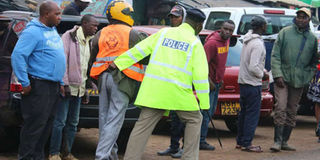Explainer: What to do after traffic police arrest

A traffic police officer arrests a boda boda rider for obstructing Safari Rally cars in Nkubu town, Meru County, on November 9, 2019. PHOTO | CHARLES WANYORO | NATION MEDIA GROUP
What you need to know:
- Given the statistics over the years, traffic police, who have topped local and international bribery indexes, know only too well where and how to catch the culprits.
- Police presence has already been increased along major roads in the country as the National Police Service and the NTSA seek to reduces road slaughter.
- Many traffic offenders choose the easy way out - bribery, a cancer that has ruined the reputation of the entire police service despite ongoing reforms, but there are other options.
The festive season is here and with it come increased travel, celebrations and entertainment, as well as arrests over traffic offences and a spike in the number of road crashes.
Given the statistics over the years, traffic police, who have topped local and international bribery indexes, know only too well where and how to catch the culprits.
Police presence has already been increased along major roads in the country as the National Police Service and the National Transport and Safety Authority (NTSA) seek to reduces road slaughter.
They will arrest drivers, conductors and passengers and impound goods.
OPTIONS
Given these risks, many choose the easy way out: bribery, a cancer that has ruined the reputation of the entire police service despite ongoing reforms.
But is reaching for the wallet or mobile money the only way to deal with traffic police and NTSA officers?
The answer is 'no', and here are the steps to take if arrested.
• Cooperate
If you are a driver, you probably remember being advised to always do as instructed by police.
Even if you believe you have not committed any offence, do not speed past the officer.
Sometimes being stopped by an officer does not mean you have committed an offence. The officer might be on a routine check.
• Do not use force
A person who uses force can be charged with resisting arrest or battery on an officer, or end up with serious injuries.
If you are arrested without probable cause, fight in court, not ion the streets.
• Call for help
A person under arrest almost never benefits by talking to the police so it is wise to assert the right to legal counsel.
Request to speak to an attorney and then find a lawyer.
Sometimes you are entitled to a phone call to your family, a bail bondsman, an attorney or a lawyer.
• Do not give bribes
If a police officer claims you have committed an offence but you believe you are not in the wrong, let the office prove the claim in court.
Do not take the easy way out by giving bribes, as bribery is an economic crime so besides the traffic offence, you can be charged with corruption.
While shunning bribery, insist on respect for your rights.
A arrested person has the right:
To be informed promptly, in language that the person understands, of:
The reason for the arrest
The right to remain silent
The consequences of not remaining silent
To remain silent;
To communicate with an advocate, and other persons whose assistance is necessary;
Not to be compelled to make any confession or admission that could be used in evidence against the person;
To be held separately from persons who are serving a sentence;
To be brought before a court as soon as reasonably possible, but not later than 24 hours after being arrested; or if the 24 hours end outside ordinary court hours, or on a day that is not an ordinary court day, the end of the next court day;
At the first court appearance, to be charged or informed of the reason for the detention continuing, or to be released; and
To be released on bond or bail, on reasonable conditions, pending a charge or trial, unless there are compelling reasons not to be released.
A person shall not be remanded in custody for an offence if the offence is punishable by a fine only or by imprisonment for not more than six months.
INSTANT FINES
The transport regulator introduced instant fines for minor traffic offences after the High Court dismissed a suit seeking to block the penalties ranging from Sh500 to Sh10,000, for offences such as talking on phone while driving or exceeding speed limits.
According to the Traffic Act gazette in 2016, some of the fines for minor offences include;
Pedestrian wilfully obstructing the free passage of vehicles: Sh500
Motorcycle operator riding without protective gear: Sh1,000
Motorcycle passenger riding without protective gear: Sh1,000
Failure to wear seat belt while motor vehicle is in motion: Sh500
Failure of a conductor of passenger service vehicle to keep seat belts in a clean, dry and generally wearable condition: Sh 500
Driver using a mobile phone while vehicle is in motion: Sh2,000
Travelling with part of the body outside vehicle – Sh1,000
Driving PSV while being unqualified: Sh 7,000
A passenger alighting at an unauthorised bus stop or terminal: Sh1,000
Failure to fit prescribed speed: Sh 10,000
The accused is released immediately after the fine is paid an authorised court staff, who will issue an official receipt and a transaction slip.

